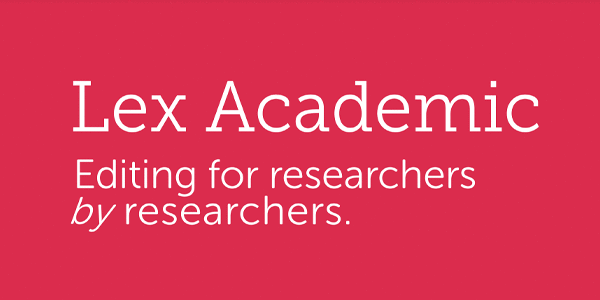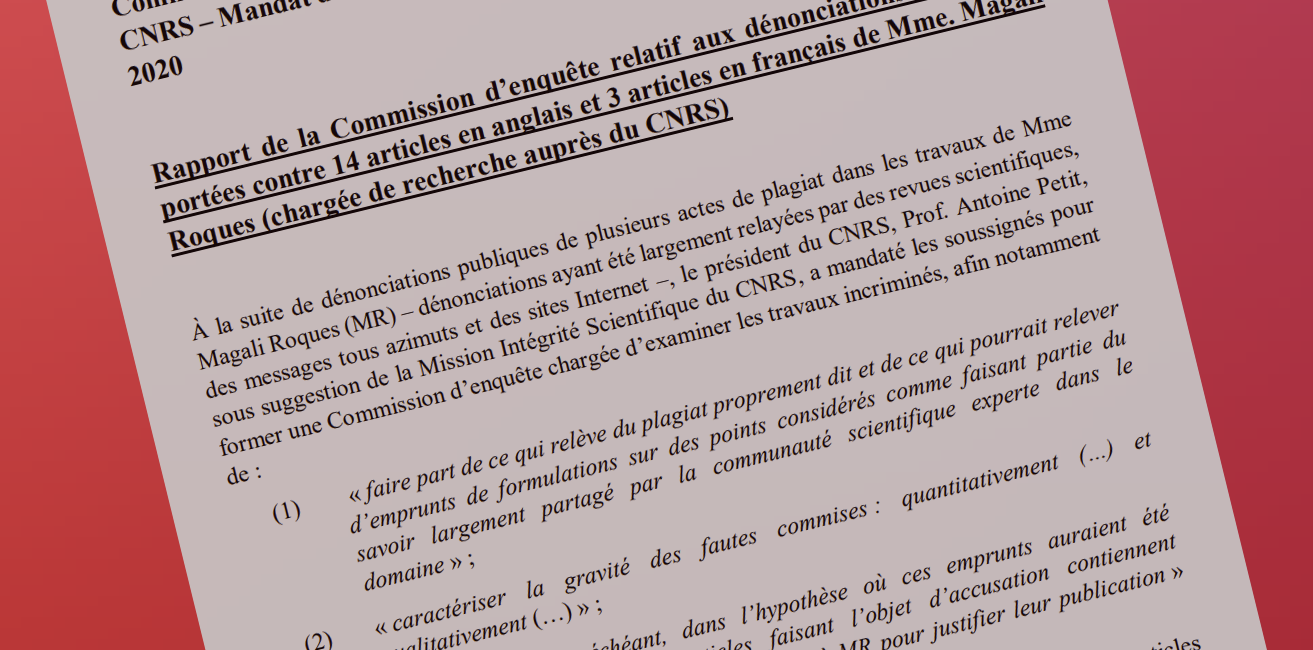Though the commission is mistaken in its own account of whether and why there has been an injustice, it is still possible that there was an injustice. After all, it’s certainly possible that having true things said about one may constitute an injustice, particularly given the reach and seeming permanence of things said on the internet. If someone wants to make the case that that is what has happened here, I’ll listen.
In line with the claim that the publicization of the accusations of plagiarism against Roques constitutes “an injustice” (see #3, above), the commission writes:
The French National Centre for Scientific Research (CNRS) has issued a statement defending a researcher in medieval philosophy against multiple charges of plagiarism.
the vast damage done to MR’s academic standing by the accusations of plagiarism seems already to outweigh in severity any sanction proportionate to the deficiencies and mistakes considered during our enquiry.
Second, no one (to my knowledge) at any point said that Roques “composed all her writings simply by copying what others have written.” That is not only a false account of the accusations against her, it is disrespectful to the editors and others who took the time and energy to painstakingly research, detail, and annotate the specific copied passages, communicate and deliberate about what to do in regard to them, and institute and announce the retractions. This is not a trivial amount of work, and it was quite clearly in evidence in the original Daily Nous post about this and its updates.
-
- The results of our qualitative analysis show that there is neither academic fraud nor plagiarism properly so called in MR’s English articles. Moreover, there is no sign to be found of a wish to appropriate anyone else’s ideas or of an intention to deceive the reader about the origin of the ideas put forward in the articles.
- The results of our quantitative analysis have shown that the proportion of unacknowledged borrowings is relatively limited—sometimes even minimal—in comparison to the total size of each article. Admittedly, a brute calculation of the passages borrowed by MR from third-parties
would tend, at first glance, to justify the accusations made against her. A more careful calculation, however – one which, in particular, takes into account the nature of the borrowings, has shown that in a number of cases it is not a matter of undeclared borrowings in the strict sense. Once the Commission had thus come to realize that many passages had been wrongly accused of being plagiarized, the proportion of borrowings open to accusation in the various articles became considerably smaller. - The qualitative and quantitative analysis of the publications under accusation has led the Commission to reach a dual conclusion. On the one hand, it is undeniable that MR has been the victim of an injustice, because her accusers have fashioned and diffused, wrongly, if not with ill intent, the shameful image of a ‘serial plagiarist’, who composed all her writings simply by copying what others have written (see ‘Philosopher Revealed as serial Plagiarist’ [multiple updates], Daily Nous). On the other hand, it is also equally undeniable that the whole body of work in English published by MR is seriously flawed by the regular presence of bad scholarly practices, by what might be called a sort of active negligence, which, although not a matter of academic fraud, cannot be excused.
- In her publications in English, MR has quite clearly lacked rigour in her way of making references and has not respected the academic standards accepted in the area. These publications suffer from serious, persistent negligence in the manner of referring to the secondary literature and sometimes also in references to the sources. In these articles, MR has therefore failed to keep to the requirement for a scrupulous and irreproachable method of work, which every researcher should observe.
- In her defence, MR cites various reasons to explain the deficiencies noted in her articles in English. Some of them (such as ‘youthful errors’ and a lack of awareness about plagiarism) did not do much to convince the Commission. The Commission did, however, accept her lack of assurance in writing English as a credible reason for MR’s frequent borrowings of technical terms and formulations from authoritative studies published in the Anglophone world. Moreover, trying to forge an academic career in an ever more competitive world, MR seems to have engaged in a race to publish, writing many articles in English at breakneck speed, but cutting corners in a number of her publications, in the method, quality and rigorousness of her research. The Commission accepts that MR’s explanations are sincere and in good faith, yet it wishes to emphasize strongly that unacknowledged borrowings, even if they are accidental, involuntary or incidental, are unacceptable according to the academic standards recognized in the area.
- The accusations of plagiarism concern the publications which were written in a limited period,
during which MR was trying to make a place for herself in the Anglophone academic world. It is exactly in this specific context that there occurred the failings that mark the articles in English. It is fitting to observe here that, before they could be published, all these articles were subject to peer review and that, in most cases, the reviewers came to very positive judgements both about the contents of the articles and the originality of MR’s contribution to the subject: judgements which convinced the editors of the academic journals in question who, although they are specialists in the area, did not notice the slightest indication of failings in these works. - The Commission notes that, in the great majority of cases, the unacknowledged borrowings discovered in the various articles occur in the parts which introduce the general area being studied, which put the questions treated into context and in syntheses about authors who are introduced by way of comparison. These borrowings do not have anything to do with either the general interpretation or the main arguments developed by MR in her works. Each of the articles examined thus presents an individual contribution of her own by MR, with her own original ideas, based on which she presents distinctive views, which she offers to specialist readers in order to engage in academic discussion among equals.
- The Commission did not discover any academic fraud or any sign of plagiarism in the three French publications. The accusations regarding these publications turned out to be to a large extent unfounded. There is, indeed, the borrowing of a phrase from an article by Irène RosierCatach, but the passage in question merely states a commonplace. That said, the Commission notes that MR’s negligence over giving references is also found to some degree in these articles.
- The Commission observes that the idea of plagiarism goes far beyond tacit citation: it signifies above all the theft of another author’s whole argument or the structure of their work or their fundamental ideas. Nothing of this sort can be attributed to MR.
- Finally, the Commission wishes to give an explicit reply to the question of whether ‘supposing that the borrowings had been correctly cited … the articles under accusation contain enough original ideas of MR’s own to justify their publication.’ It can indeed confirm that if MR had cited all her borrowings correctly, this would not have lessened the number of original ideas that she proposes in the articles under accusation. The publication of these articles would therefore be entirely justifiable if MR put her borrowings into inverted commas and attributed them correctly to their authors.
While I appreciate the commission not ascribing to me any ill-intent, I will note that this passage appears to contain two mistakes.

I think I should respond to this passage, from #3, above:
First, the commission takes the term “serial plagiarist” to be an error. To the contrary, in ordinary academic practice, “plagiarism” includes the very kind of behavior that led to the retraction of multiple articles by Roques; and indeed, several of the editors of the volumes responsible for the retractions expressly identified plagiarism as the reason for them. My failure to use the commission’s own peculiarly narrow conception of plagiarism, for which it provides no support, does not mean that I’ve wrongly described what has happened.
* * * * *

The commission also notes that it is not up to them “what course of action the CNRS should take in response to this affair.”
Using a conception of plagiarism according to which plagiarism “signifies above all the theft of another author’s whole argument or the structure of their work or their fundamental ideas,” distinguishing between “plagiarism” and “unacknowledged borrowings,” and noting that they were unable to discern in Roques’ writings “a wish to appropriate anyone else’s ideas or of an intention to deceive the reader about the origin of the ideas put forward in the articles,” the commision concludes that though they are “seriously flawed by the regular presence of bad scholarly practices,” her work contains “neither academic fraud nor plagiarism properly so called.”
It is undeniable that MR has been the victim of an injustice, because her accusers have fashioned and diffused, wrongly, if not with ill intent, the shameful image of a ‘serial plagiarist’, who composed all her writings simply by copying what others have written (see ‘Philosopher Revealed as serial Plagiarist’ [multiple updates], Daily Nous).
You can read the commission’s entire report here.
Here are the commissions “primary findings” (the report refers to Roques as “MR”):
Commenters on this post must use their real names (first and last) when commenting.
Please avoid insults, speculations about people’s character, and the like.
See the Comments Policy.
Comments are moderated and may take some time to appear.
Last fall, several articles by Magali Roques were retracted owing to them containing passages copied from others without attribution (details here). A commission composed of “three experts in the field, all foreigners” was tasked by CNRS to investigate, and the results of that investigation have recently been made public by CNRS.





